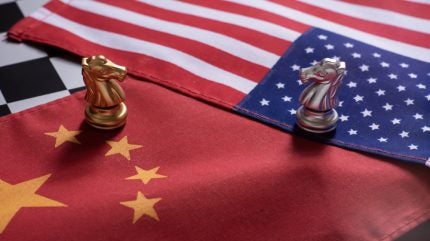
The future of the BIOSECURE Act was made more uncertain over the weekend after senators left the legislation out of a pivotal defence budget bill.
The omission means the act, which intends to prevent Chinese biotechs and manufacturers from accessing US funding and collaborating with US pharma companies using federal funding, will likely miss the chance to be passed this year before Congress heads into the holiday recess.

Discover B2B Marketing That Performs
Combine business intelligence and editorial excellence to reach engaged professionals across 36 leading media platforms.
Five Chinese biotechs are currently mentioned in the act, namely WuXi AppTec and WuXi Biologics, as well as BGI Group and subsidiaries MGI Tech and Complete Genomics.
Shares in WuXi AppTec opened 10.5% higher on 9 December compared to the market close before the weekend. The Hong Kong-listed biotech has a market cap of $185.4bn.
A WuXi AppTec spokesperson told Pharmaceutical Technology: “The company is aware that the BIOSECURE Act was not included in the latest published version of the FY2025 National Defense Authorisation Act.
“We continue to provide lawmakers and federal agencies with the facts about our company and educate them on the valued services we provide customers in the US and around the world.”

US Tariffs are shifting - will you react or anticipate?
Don’t let policy changes catch you off guard. Stay proactive with real-time data and expert analysis.
By GlobalDataWhilst the BIOSECURE Act did not make the cut, the $886bn National Defense Authorisation Act for Fiscal Year 2025 did include plans to secure biotechnology supply chains “critical to the national security of the US” as part of a broader intelligence strategy.
While it is now uncertain whether the bill will make it through the current Congress, US President-elect Donald Trump’s rhetoric in China means it won’t be completely absent in the political pipeline. However, the incoming administration did not emphasise the act in the lead-up to the election, with changes at US federal agencies and reproductive health control at the top of Trump’s agenda.
The BIOSECURE Act has gone through several iterations since its controversial unveiling. The bill was passed by the US House of Representatives in September by a large majority with bipartisan support. However, concerns have been raised about the impact the bill would have on the R&D and manufacturing of medicines, given the heavy reliance on Chinese companies in the supply chain. For example, WuXi has one of the largest biologics manufacturing networks globally and is a frequent partner among big pharma companies.
Several biopharmaceutical companies, including MSD, Gilead Sciences, and Vertex Pharmaceuticals, have cited increased costs, delays in clinical trials, US Food and Drug Administration (FDA) regulatory submissions and launch of drugs as potential impacts of the BIOSECURE Act, according to a report by GlobalData.
GlobalData is the parent company of Pharmaceutical Technology.
The analysis also demonstrates that the act could impact more than 120 US biopharmaceutical drugs with Chinese biotech involvement, of which 60% are marketed or in late clinical-stage trials.
WuXi and BGI have both previously laid out their concerns. WuXi called the bill “a pre-emptive and unjustified designation without due process that the company strongly objects to” in a September statement.
Meanwhile, BGI said towards the start of this year that the bill contains “falsehoods and baseless allegations” that will only strengthen monopolies in the US.




